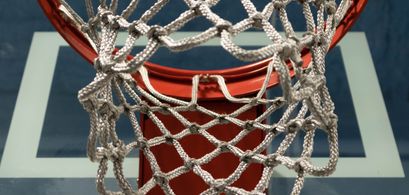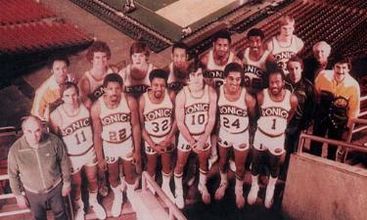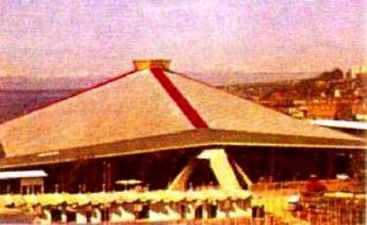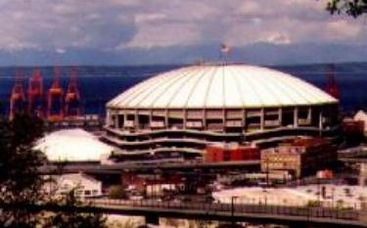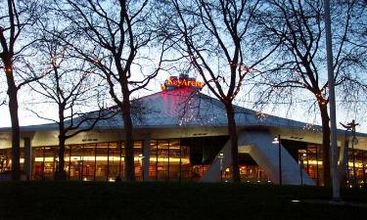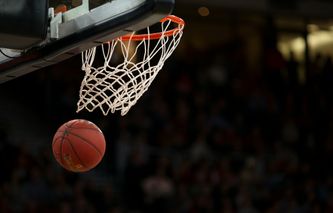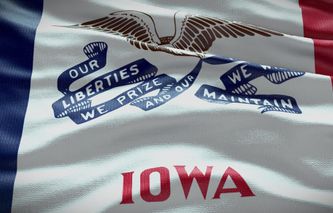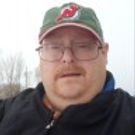First Game Played October 13, 1967
Last Game Played April 16, 2008
Moved to Oklahoma City in 2008

Historical Moments
1967/68:The NBA landed in the Pacific Northwest as the Seattle Supersonics joined the league as one of two new expansion teams. The Sonics picked up Tom Meschery, Walt Hazzard, Bob Weiss, and Rod Thorn while drafting Al Tucker with the sixth overall pick. On October 13th, the Sonics coached by Al Bianchi lost their first game to the San Francisco Warriors on the road. A week later, the Sonics dropped their first home game to their expansion partner San Diego Rockets 121-114. A day later, the Sonics would get revenge beating the Rockets for their first win 117-110 in San Diego. However, the Sonics would win just one game in their next 12 after that while finishing in fifth place with a typical expansion record of 23-59.
1968/69:Before the start of the season, the Supersonics acquire Lenny Wilkens from the Atlanta Hawks for Walt Hazzard. Wilkens would have a solid season finishing 99 in scoring with 22.4 ppg while finishing second with 8.2 assists per game. However, Bob Rule would become the star of the team finishing fourth in scoring with 24.0 ppg, as the second year Sonics showed some life early with a five-game winning streak in November. However, they would still play like an expansion team by losing 18 of 20 games shortly after that on the way to finishing in sixth place with a 30-52 record.
1969/70:Before the start of their third season, the Supersonics fire Coal Al Bianchi and replace him with All-Star Lenny Wilkens, who would serve as player-coach. In Wilkens’s first coaching experience, the Sonics continue to show improvement thanks in part to the play of Wilkens himself, who leads the league with 9.1 assists per game. The Sonics would go on to finish in fifth place with a 36-46 record closing the season out on a strong note by winning 17 of their last 29.
1970/71:Lenny Wilkens continued to serve as player-coach winning the All-Star Game MVP while finishing second in the NBA with 9.2 assists per game as the Sonics continue to improve by baby steps finishing in fourth place with the newly established Pacific Division with a 38-44 record. However, the biggest news came in a different court for the Sonics, as they challenged a rule stating that ABA Rookie of the Year & MVP Spencer Haywood belonged to the Detroit Pistons, who drafted him after he signed with ABA upon leaving college early. Haywood, who had a spectacular first season with the Denver Rockets of the ABA agreed to sign with the Sonics. However, the Sonics needed to have the Pistons’ rights, and ABA contract voided. After a season-long battle, Heywood was finally allowed to play for the Supersonics, averaging 20.6 ppg in 33 games.
1971/72:In his first full season with the Supersonics Spencer Haywood had an All-Star season finishing fourth in the league with 26.2 ppg as the Sonics posted their first winning season at 47-35 while finishing in third place. However, the Sonics would fall four games short of their first playoff appearance. Following the season, the Sonics would trade player-coach Lenny Wilkens to the Cleveland Cavaliers for Butch Beard.
1972/73:The Supersonics entered the season with high hopes but ended up taking a significant step backward as they sorely missed Lenny Wilkens on the court leadership, as they struggled to post a 26-56 record under two coaches. At the same time, Wilkens continued to be one of the top assist leaders with the Cleveland Cavaliers. Despite the disappointing season, Spencer Haywood continued to star as he finished third in scoring with 29.2 ppg.
1973/74:Boston Celtics Legend Bill Russell joins the Supersonics as Coach and General Manager. Under Russell, the Sonics would show substantial improvement finishing in third place with a 36-46 record.
1974/75:The Supersonics continued to play well under Bill Russell as they hovered around .500 all season before closing the year with a seven-game winning streak to make the playoffs for the first time in franchise history with a record of 43-39. In their first playoff appearance, the Sonics played like playoff veterans beating the Detroit Pistons in a three-game series. In the second round, the Sonics would battle the Golden State Warriors splitting the first four games, before falling in six games to the eventual NBA Champions.
1975/76:Downtown Freddie Brown continues to establish himself as one of the top scorers in the NBA finishing 5th in scoring with 23.1 ppg, as the Supersonics made it into the playoffs for the second straight season with a record of 43-39. After a first-round bye, the Sonics would be beaten by the Phoenix Suns in six games after falling behind early three games to one.
1976/77:After two straight seasons making the playoffs with a winning record, the Supersonics take a step backward, finishing in fourth place with a disappointing record of 40-42. Following the disappointing season, General Manager and Coach Bill Russell would resign.
1977/78:Under new coach Bob Hopkins the Supersonics had a different look as veteran Paul Silas, rookie Jack Sikma, shot-blocker Marvin Webster, volatile Gus Williams, and dependable John Johnson joined the team. However, the new-look Sonics struggled out of the gate, winning just five of their first 22 games before Coach Bob Hopkins is fired. The Sonics would turn to their past to replace Hopkins, hiring one-time player-coach Lenny Wilkens to replace him. Wilkens took over the Sonics on November 30th as the Sonics won six games in a row and 12 of 13 games under Wilkens on the way to finishing in third place with a solid 47-35 record. In the playoffs, the Sonics would sneak by the Los Angeles Lakers in a three-game series in the first round. In the second round, the Sonics faced the defending champion Portland Trail Blazers who had finished the season with the best record in the NBA. The Supersonics would get off to a quick start taking Game 1 in Portland. After losing Game 2, the Sonics took control of the series upon arriving home, winning two straight games to grab a 3-1 series lead. After losing Game 5 on the road, the Sonics completed the upset with a 105-94 win at home. Moving on to the Western Finals, the Supersonics again jumped out to a 3-1 lead before beating the Denver Nuggets in six games to reach the NBA Finals. Facing the Washington Bullets in an improbable NBA Final, the Supersonics jumped out to a 2-1 series lead. With Game 4 in Seattle, the Sonics had an opportunity for a 3-1 series lead; however, they would lose a hard-fought battle 120-116. The Sonics would rebound to win Game 5 at home, before a road loss in Game 6 set up a dramatic Game 7 conclusion in Seattle. However, the Sonics championship dreams would be shot down by the Bullets who won the title with a 105-99 win in front of a sold-out crowd at the Center Coliseum.
1978/79:Due to increased demand in ticket sales, the Supersonics decide to play their home games at the Kingdome. They were coming off a trip to the NBA Finals the Sonics would put together their finest season winning their first Division Championship with a solid 52-30 record. After a first-round bye in the playoffs, the Supersonics made quick work of the Los Angels Lakers, taking the series in six games to advance to the Western Conference Finals. In the Western Finals, the Sonics would get off to a fast start beating the Phoenix Suns in the first two games at home. However, as the series shifted to Phoenix, the Sonics would struggle to lose two straight games as the Suns even the series a two games apiece. Back home in Game 5, the Sonics were anything but super losing 99-93 as the Suns took a 3-2 series lead. Needing to win Game 6 on the road, the Sonics rose to the occasion, winning a heart-stopping game 106-105 to force a seventh game at the Kingdome. In Game 7, the Sonics would jump out to an early lead and hold off a late charge by the Suns to win 114-110 and set up an NBA Finals rematch with Washington Bullets. In the Finals, the Sonics would get off to a shaky start losing Game 1 on the road 99-97. The Sonics would rebound to win the next game 92-82, as the series shifted to Seattle tied at a game apiece. In Seattle, the Supersonics took a commanding 3-1 series lead by winning Game 3 by ten points and Game 4 by two points. Back in Washington for Game 5, the Sonics did not take any chances closing out the series with a 97-93 win to claim their first-ever NBA Championship as Dennis Johnson was named NBA Finals MVP.
1979/80:Coming off their NBA Championship, the Supersonics were even stronger, posting a 56-26 record. However, they would have to settle for second place Los Angeles Lakers team that had been bolstered by the arrival of rookie Magic Johnson. As Downtown Freddie Brown took advantage of the new three-point line, becoming the league’s first-ever three-point percentage leader at .443. In the playoffs, the Sonics would get off to a solid start beating the Portland Trail Blazers in a three-game series. In the second round, the Supersonics would find themselves facing elimination on the road as they trailed the Milwaukee Bucks three games to two. However, the Championship tested Sonics beat the Bucks in a defensive struggle 86-85 to force a seventh game in Seattle where the Sonics advanced to their 3rd straight conference final with a 98-94 win. However, in the Western Finals, the Sonics reign would come to an end as the Los Angeles Lakers beat them in seven games.
1980/81:After losing in the Conference Finals, the Supersonics began to unravel as Dennis Johnson was traded to the Phoenix Suns for Paul Westphal, as steadying influence Paul Silas retired and became coach of the San Diego Clippers. Also, the Sonics would miss Gus Williams, who sat out the entire season in a contract dispute. Without critical players, the Sonics plummeted in the standings finishing in last place with a woeful record of 34-48.
1981/82:Gus Williams would return to the Sonics lineup as the Supersonics rebounded off their disappointing last-place season to finish in second place with a solid 52-30 record. In the playoffs, the Supersonics would knock off the Houston Rockets in a three-game series. However, in the second round, the Sonics should be knocked off by the San Antonio Spurs in five games.
1982/83:The Supersonics got off to a fast start winning their first 12 games, as they entered the New Year with a solid 23-7 record. However, as January rolled around, the Sonics came crashing down to earth with an eight-game losing streak. The Sonics would continue to sputter into March before they closed the season with 15 wins in their last 17 games to finish in third place with a 48-34 record. However, in the playoffs, the Sonics would make a quick exit as the Portland Trail Blazers beat them in two straight games.
1983/84:The Supersonics would undergo an ownership change as Sam Schulman sold the team to Barry Ackerley. On the court, the Supersonics were hard to beat at home, posting a 32-9 record in the Kingdome. However, on the road, the Sonics would win just ten games as they finished in third place with a mediocre 42-40 record. In the playoffs, the Supersonics would hold a 2-1 series lead with Game 4 at home against the Dallas Mavericks. However, the Sonics would lose Game 4 as the Mavericks won the series with a 105-104 victory in Game 5.
1984/85:The Supersonics were a mere shell of the team that won the NBA Championship six years earlier as they struggled all season after the retirement of Downtown Fred Brown, finishing in fifth place with a 31-51 record as they closed out the season with 12 losses in their final 13 games. Following the season coach Lenny Wilkens would be bumped up to the front office. He would return to coaching a year later with the Cleveland Cavaliers and would go on to set a record for most wins and losses as a head coach.
1985/86:Under new coach Bernie Bickerstaff, the Supersonics continued to struggle as they moved back into the Seattle Center Coliseum with ticket demand no longer as high as it was during the Championship years. The Sonics would go on to finish in fifth place again with a 31-51 record.
1986/87:Before the start of the season, ten Supersonics would re-tool trading Jack Sikma to the Milwaukee Bucks for Alton Lister. The move signaled a change from a half-court offense to a looser, up-tempo approach that featured pressure defense and a bombs-away attack as the Supersonics made it back into the playoffs by finishing in fourth place with a 39-43 record. Along the way, Tom Chambers made fans proud winning MVP honors as Seattle hosted the All-Star Game. In the playoffs, the Sonics would get off to a solid start stunning the Dallas Mavericks in four games by winning three straight games after a blow out loss in Game 1. Moving on to the second round, the Supersonics continued to play their best basketball as they jumped out to a 3-1 series lead on the way to stunning the Houston Rockets in six games. However, the Sonics would come crashing down to reality in the Western Conference Finals, as the Los Angeles Lakers swept them in four straight games. Following the season, the Supersonics would make one of the worst draft day deals in NBA history when they traded the rights to Scottie Pippen to the Chicago Bulls for rights to Olden Polynice.
1987/88:After their improbable trip to the Conference Finals, the Supersonics played strong basketball all season, finishing in third place with a 44-38 record as Dale Ellis 25.8, Xavier McDaniel 21.4, and Tom Chambers 20.4 averaged more than 20 points per game. However, in the playoffs, there would be no repeat off their miracle run a year earlier as the Denver Nuggets beat the Sonics in a five-game series.
1988/89:The Supersonics decided to re-tool again as they allowed Tom Chambers to sign a free agent deal with Phoenix Suns while acquiring rebounding champ Michael Cage from the Los Angeles Clippers. Without Chambers, the Sonics still had enough firepower as Dale Ellis finished third in the league in scoring with 27.5 ppg, which was highlighted by 46 points scored on opening night against the Utah Jazz. The Sonics would go to finish in third place with a solid 47-35 record. In the playoffs, the Sonics would knock off the Huston Rockets in four games. However, in the second round, the Sonics would hardly put up a fight as the Los Angeles Lakers swept them in four straight games.
1989/90:In the draft, the Supersonics take a gamble by drafting Shawn Kemp, who had never played a single game in college. In his first season, Kemp labeled the Man-child played only a few minutes but got into 81 games, averaging 6.5 points and 4.3 rebounds while blocking 70 shots. The most exciting game of the season came on November 9th as the Sonics beat the Milwaukee Bucks in 5 overtimes 155-154. However, the Supersonics would miss the playoffs by finishing in fourth place with a 41-41 record. Following the season, the Sonics would fire Coach Bernie Bickerstaff replacing him with K.C. Jones how had led the Boston Celtics to two Championships.
1990/91:The Supersonics continued to struggle as Xavier McDaniel was sent to the Phoenix Suns on December 7th in exchange for long-distance threat Eddie Johnson. Next, Dale Ellis departed for the Milwaukee Bucks on February 15th in a trade for Ricky Pierce, another scoring threat. Finally, on February 20th, the Sonics sent Olden Polynice to the Los Angeles Clippers for Benoit Benjamin. Among the Sonics who remained for the entire season, Derrick McKey and Shawn Kemp led the team in scoring as rookie Gary Payton led the team in assists. Even though the change over the Sonics would sneak into the playoffs with a 41-41 record, in the playoffs, the Sonics would give a strong performance as they pushed the top-seeded Portland Trail Blazers to a fifth game, before bowing out with a 119-107 loss.
1991/92:After solid 7-3 start, the Supersonics seemed to lose focus as Coach K.C. Jones is fired on January 15th, with the Sonics holding a mediocre 18-18 record. After splitting four games under interim Coach Bob Kloppenburg, the Sonics would hire George Karl to run the team. Under Karl, the Sonics would finish the season on a strong note, finishing in fourth place with a 47-35 record. IN the playoffs, the Supersonics would continue to play strong basketball as they upset the Golden State Warriors in four games as Shawn Kemp, who was six months shy of his 23rd birthday, dominated the Warriors averaging 22.0 points and 16.3 rebounds per game. However, in the second round, the Sonics would be upended by the Utah Jazz in five games.
1992/93:Everything came together for the young Sonics who established themselves as one of the up and coming teams in the NAB by finishing in second place with a solid 55-27 record, as Shawn Kemp, who had always been capable of spectacular offensive moves and dramatic slam-dunks, began to acquire a mature focus. While point guard Gary Payton gained a reputation as a tenacious on-the-ball defender, in the playoffs, the Supersonics would be tested right away as they faced elimination against the Utah Jazz after dropping two of the first three games. The Sonics would win Game 4 on the road to force a fifth game, which they won 100-92 at the Seattle Center Coliseum. In the second round the young Sonics would be put to the test again as they needed overtime in Game 7 to beat the Houston Rockets 103-100 in a series in which the home team won all seven games. Facing the heavily favored Phoenix Suns in the Western Conference Finals the Sonics would once again find themselves in a seventh game. However, with Game 7 in Phoenix, the Suns would go on to the NBA Finals with a 123-110 victory.
1993/94:After falling one game short of the NBA Finals, the Supersonics were even better as they picked up Detlef Schrempf and Kendall Gill in preseason trades and jumped out of the gate winning 20 of their first 22 games on the way to an NBA best record of 63-19. In the playoffs, the Sonics appeared to be on their way as they dominated the Denver Nuggets in the first two games at home. However, as the series shifted to Denver, the Sonics began to struggle as the Nuggets evened the series with two wins to force a decisive fifth game. In Game 5, the Sonics approached Game 5 as an inconvenience as they figured to beat the Nuggets easily at home since no eighth seed and had ever beaten a top seed. However, the Nuggets were able to get the game into overtime as the Sonics continued to struggle. In overtime, the Sonics would not be able to right themselves as the Nuggets completed the upset with a 98-94 win as the Sonic sonly showed real desperation in the final seconds.
1994/95:Playing in the Tacoma Dome while the Seattle Center Coliseum is torn down and replaced by a new arena, the Supersonics shake off their playoff collapse by posting a solid 57-25. However, they are forced to settle for second place, as they lose a tight battle with the Phoenix Suns for the Pacific Division by just two games. However, once again, the Sonics would choke in the first round of the playoffs as they are beaten by the Los Angeles Lakers in four games, losing three straight games, after taking the first game by 25 points.
1995/96:After starting the season with a loss on the road, the Supersonics opened the new Key Arena by beating the Los Angeles Lakers 103-89 on November 4th. The Supersonics would go on to dominate the Western Conference posting a franchise-best 64-18 record on the way to the top seed in the West. However, after failing in the first round, the previous two season fans would wait until the playoff to judge if the season was successful or not. In the first round, Sonics fans had to have a sense of deja vu as they dropped Game 2 at home to the Sacramento Kings 90-81. However, knowing their season was on the line, the Sonics buckled down and won to straight in Sacramento to win the series in four games. In the second round, the Sonics continued to roll as they knocked off the two-time defending NBA Champion Houston Rockets in four straight games to make it back to the Western Conference Finals. In the Western Finals, ten Sonics would get off to a fast start as they jumped out to a 3-1 series lead over the Utah Jazz. However, the Sonics would need a hard-fought 90-86 win in Game 7 at the Key Arena to reach the NBA Finals after losing two straight games. In the NBA Finals, the Supersonics would be matched up against the Chicago Bulls, who had dominated the league all season, posting an all-time best record of 72-10. Through the first three games, the Sonics looked overmatched as the Bulls dominated on the way to a 3-0 lead. However, the prideful Sonics would not be swept as they beat the Bulls 107-86. The Sonics would also win Game 5 to send the series back to Chicago. However, the Sonics hopes of an improbable comeback came to an end, as they were beaten 87-75 in Game 6.
1996/97:Coming off their trip to the NBA Finals, the Supersonics remained one of the elite teams in the West as won their last three games to edge to the Los Angeles Lakers by one game for their third division championship in four years with a record of 57-25. In the playoffs, the Sonics were tested early, as they needed a dramatic win in Game 4 on the road to force a fifth game at Key Arena against the Phoenix Suns, which the Sonics won 116-92. In the second round, the Sonics would find their backs to the wall again as they trailed the Houston Rockets three games to one. The Sonics would not go down without a fight as they battled their way back to force a seventh game. However, with Game 7 in Houston, the Sonics would fall 99-96 as they nearly rallied from a 14-point 4th quarter deficit.
1997/98:After falling in the second round, the Supersonics would re-tool by trading away Shawn Kemp in a three-team deal that saw the Sonics acquire three-time All-Star from the Milwaukee Bucks. Bake became an instant fan favorite as he delivered three buzzer-beaters while averaging 19.2 ppg and 8.0 rpg for the season, as the Sonics captured the Pacific Division again with a 61-21 record. In the playoffs, the Sonics struggled again, as they need a road win in Game 4 to rally past the seventh-seeded Minnesota Timberwolves in five games. In the second round, the Sonics season would come to a disappointing end again as they are beaten by the Los Angeles Lakers in five games, losing four straight after taking Game 1. Following the season, George Karl would be allowed to walk away from the Sonics, signing on to coach the Milwaukee Bucks as his “favorite player,” Nate McMillan retired.
1998/99:After a four-month lockout wiped out half the season, the Supersonics got off to a strong start under new Coach Paul Westphal winning their first six games. However, the Sonics would soon fall apart as they lost six of their next nine games. From there, the Sonics would play around .500 for the rest of the season missing the playoffs for the first time in nine years with a disappointing fifth-place record of 25-25.
1999/00:After missing the playoffs the Supersonics rebound to finish in 4th place with a 45-37 record thanks to another stellar season from Gary Payton who led the team in scoring (24.2 ppg), assists (8.9 apg), steals (1.87 spg) and minutes (41.8 mpg). In the playoffs, the Sonics would find themselves backed against the wall right away as they dropped the first two games to the Utah Jazz on the road. However, the Sonics would rebound to force a fifth game with two straight wins at the Key Arena. In Game 5 at Utah, the Sonics would battle the Jazz all the way but fall three points short as the Jazz advanced with a 96-93 win.
2000/01:With the hopes of improving the team in the middle, the Supersonics acquire future Hall of Famer Patrick Ewing from the New York Knicks in a three-team deal. However, the Sonics would get off to a slow start losing seven of their first ten games. Despite winning three of their next five games, coach Paul Westphal would be fired and replaced by Nate McMillan on November 27th. However, under McMillan, the Sonics would continue to play mediocre basketball as Ewing struggled all season to post a disappointing 9.6 ppg With the playoffs all. Still, out of reach in the highly competitive Western Conference, the Sonics ended the season on a strong note winning 11 of their last 16 games to post a 44-38 record on the season finishing in fifth place. Patrick Ewing would not be re-signed following his disappointing season in Seattle.
2001/02:Heading into Nate McMillan’s first full season as coach, the Supersonics were not expected to do much as they went back to their traditional colors of green and yellow. However, the Sonics led by the timely shots of Brent Barry and the tenacious defense of Gary Payton overcame a series of injuries to finish in fourth place with a 45-37 record. In the playoff, the Sonics would give the San Antonio Spurs all they could handle before falling in five games. Following the season, the Sonics would begin to rebuild by trading Vin Baker to the Boston Celtics for Kenny Anderson.
2002/03:The Supersonics would get off to a solid start despite a developing feud between management and free agent to be Gary Payton winning eight of their first ten games. However, the Supersonics would take a sudden turn for the worse losing four straight games by a total of 7 points. By the All-Star Break, the Sonics were all but out of the playoff picture as rumors of a trade involving Gary Payton began to circulate. On the February 20th trade deadline with Sonics holding a record of 23-30 traded Payton and Desmond Mason to the Milwaukee Bucks for All-Star Ray Allen, Kevin Ollie, Ronald Murray, and a conditional first-round draft pick. After the trade Allen would play solid basketball as the Sonics made a late run for the final playoff spot posting an 18-12 record in their last 30 games to close the season with a 40-42 record finishing just four games short of the playoffs as Allen averaged 24.5 ppg, 5.9 apg, and 5.6 rpg.
2003/04:he Supersonics started the season in Tokyo with a two-game series against the Los Angeles Clippers. The Sonics would win each game as Rashard Lewis stole the show with a career-high 50-point game in the second game. Coming back to America, the Sonics remained hot as they got off to a 5-1 start. In December, the Sonics began to struggle to win just five of 13 games, as injuries began to hamper the team. In total, the Supersonics would lose 126 total man-games due to injuries as Ronald Murray was the only player to play in every game. As the season wore on, the Sonics faded out of the playoff picture, eventually finishing in fifth place with a 37-45 record.
2004/05:Heading into the season, not much was expected from the Supersonics who had a lame-duck coach and a Free Agent Guard who were expected to be each in their final year in Seattle. However, the Sonics would come flying out of the gates, winning 13 of their first 15 games on the way to leading the newly established Northwest Division wire-to-wire. Leading the way was the Free Agent Ray Allen, who averaged 23.9 ppg for the Supersonics who posted a solid 52-30 record. Down the stretch, the Sonics would stumble winning just three of their final 12 games, which had fans worried as they began a playoff match up with the Sacramento Kings. However, once the postseason started, the Supersonics were able to find their stride again, winning the series relatively easily in five games. In the second round, the Sonics faced a much tougher test in the San Antonio Spurs. After losing the first two games on the road, the Sonics survived a last-second miss from Tim Duncan to hold on to a 92-91 win to keep their title hopes alive, as they also won Game 4 at home 101-89 to even the series. After losing Game 5 on the road, the Sonics would battle the Spurs tough again. However, unlike Game 3, Duncan was able to hit the game-winner as the Spurs ended the series in six games with a 98-96 win. Following the season, the Sonics would resign Ray Allen but fail in their attempts to bring back coach Nate McMillian, who took a bigger deal to coach the Portland Trail Blazers.
2005/06:To replace Nate McMillian, the Supersonics named Bob Weiss as their new coach. Early on, it was clear the formula was not right as the Sonics stumbled out of the gate, losing four of their first five games, as they limped to a mediocre 6-8 record in November. The Sonics were not much better in December, and when they lost their first game in 2006, management decided to head in a different direction, as Weiss was fired after just 30 games with a 13-17 record. Under new Coach Bob Hill, the Supersonics would not fare much better, losing seven of eight games after a 101-97 win in Hill’s debut against the Chicago Bulls on January 4th. There would be no saving the Sonics as they finished in third place with a disappointing 35-47 record. Providing the only bright spots would be Ray Allen and Rashard Lewis, who each averaged more than 20 points per game. As the season ended, the biggest concern for Seattle fans became the future of the team, as the Sonics were sold to an ownership group in Oklahoma City, who has expressed desire of moving a team to Oklahoma City, as the Sonics claimed Key Arena which was only renovated a decade earlier was old and needed to be replaced. As the Supersonics lease expired in 2010, fans began forming a group called Save Our Sonics aimed at keeping the team in Seattle.
2006/07:The misery continued in Seattle as talk of the Sonics leaving Seattle got louder with the sale of the team to Oklahoma City Business Man Clay Bennett. NBA Owners approved a deal, Bennett began issuing an ultimatum to the City of Seattle that if there were no plan for a new arena by October 31, 2007, he would move the team. On the court, the Sonics were not much better as they endured another terrible season finishing at the bottom of the Northwest Division with a record of 31-51. Following the season, the Supersonics would make wholesale changes as Coach Bob Hill was fired and replaced by P.J. Carlesimo. Meanwhile, the Sonics who finished second in the draft lottery began to rebuild the team by trading Ray Allen to the Boston Celtics for rights to the fifth pick Jeff Green, Wally Szczerbiak, and Delonte West. At the same time, they traded Allen; they lost Rashard Lewis via free agency to the Orlando Magic. After using the number two draft pick for Kevin Durant, the Sonics added some veteran help by signing Kurt Thomas from the Phoenix Suns.
2007/08:The season began with the Supersonics being a lame duck team, as talks with the City of Seattle for a new arena had broken down, as Owner Clay Bennett made it known that he would like to move the tea, to his hometown Oklahoma City. On the court, the Sonics had gotten a franchise player with the second overall pick in the NBA draft with Kevin Durant out of Texas. However, with the Ray Allen trade, the Sonics did not have many talents to surround their rookie forward, as they lost their first eight games under Coach P.J. Carlesimo on the way to a 3-14 record in the first month of the season. Things did not get better after that as the clouds of Bennett’s plans to move the team hung over the team all season. Durant would live up to expectations, as he led all rookies in scoring at 20.3 ppg and won the Rookie of the Year. However, the Seattle Supersonics posted a franchise-worst record of 20-62. It would end up being the final season in Seattle, as Clay Bennett ended up getting the right to move the team after settling all the legal issues with the city. In the settlement, Bennett agreed to pay $45 Million to Seattle, with the possibility of owning an additional $30 million is the city is not awarded another NBA franchise by 2013. NBA Commissioner David Stern has expressed a desire to return to Seattle as soon as possible if a new arena is built. If that day comes when basketball returns to Seattle, the team will be called Supersonics, as the settlement required the franchise to leave behind the team’s colors, and nickname, choosing to become the Oklahoma City Thunder.
Championship Teams
Supersonics Arenas
Super Supersonics
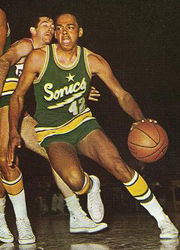 Walt Hazzard 1967/68, 1973/74 | 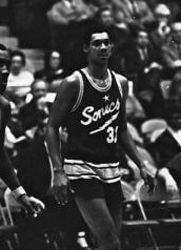 Al Tucker 1967-1969 | 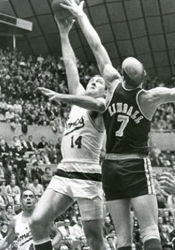 Tom Meschery 1967-1971 | 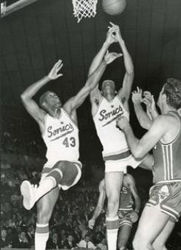 Bob Rule 1967-1971 | 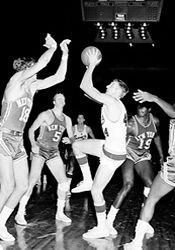 Rod Thorn 1967-1971 | 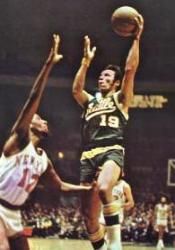 Lenny Wilkens 1968-1972 |
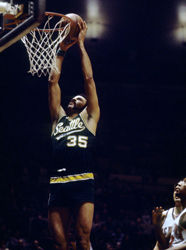 Zaid Abdul-Aziz 1970-1972, 1975/76 | 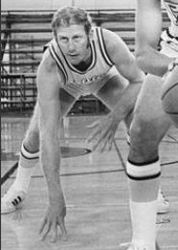 Don Kojis 1970-1972 | 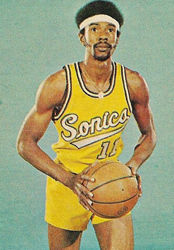 Lee Winfield 1969-1973 | 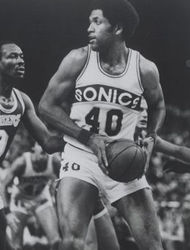 Gar Heard 1970-1973 | 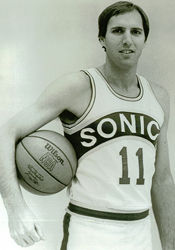 Dick Snyder 1969-1974, 1978/79 | 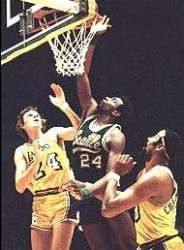 Spencer Haywood 1970-1975 |
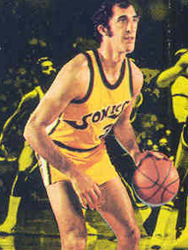 Jim Fox 1972-1975 | 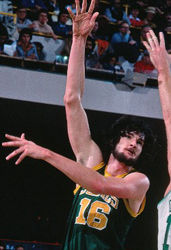 Tom Burleson 1974-1977 | 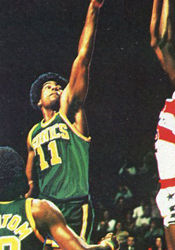 Leonard Gray 1974-1977 | 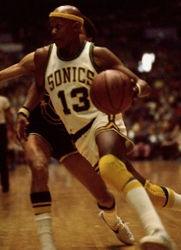 Slick Watts 1973-1978 | 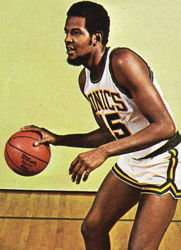 Bruce Seals 1975-1978 | 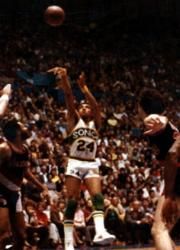 Dennis Johnson 1977-1980 1979 NBA Finals MVP |
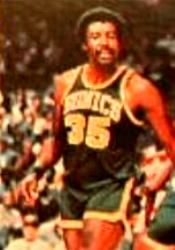 Paul Silas 1977-1980 | 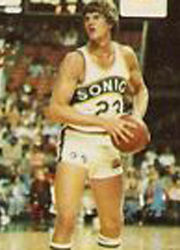 Tom LaGarde 1978-1980 | 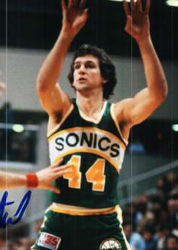 Paul Westphal 1980/81 | 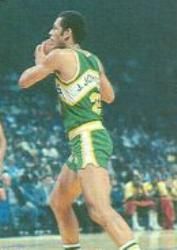 John Johnson 1977-1982 | 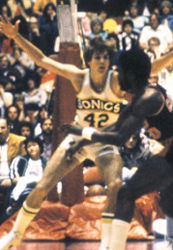 Wally Walker 1977-1982 | 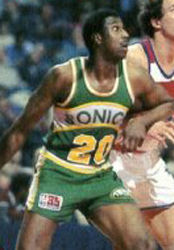 James Bailey 1979-1982 |
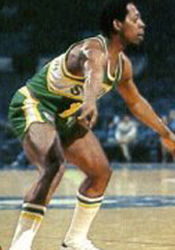 Vinnie Johnson 1979-1982 | 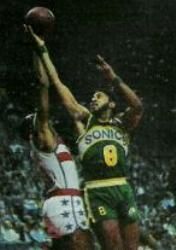 Lonnie Shelton 1977-1983 | 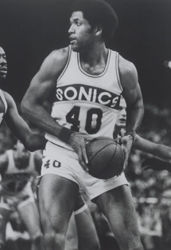 James Donaldson 1980-1983 | 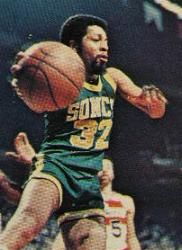 Fred Brown 1971-1984 | 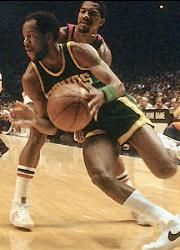 Gus Williams 1977-1980, 1981-1984 | 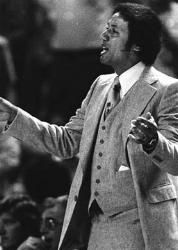 Lenny Wilkens Coach 1969-1972, 1977-1985 |
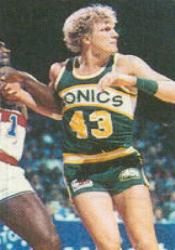 Jack Sikma 1977-1986 | 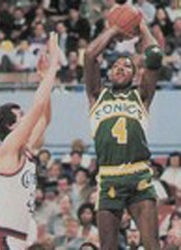 Al Wood 1983-1986 | 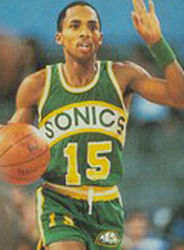 Gerald Henderson 1984-1987 | 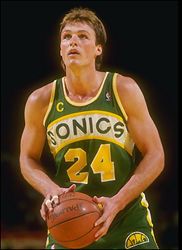 Tom Chambers 1983-1988 | 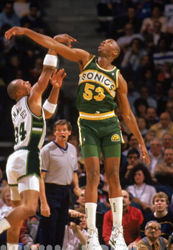 Alton Lister 1986-1989 | 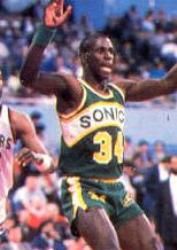 Xavier McDaniel 1985-1990 |
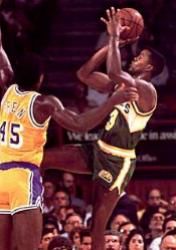 Dale Ellis 1986-1991, 1997-1999 1987 Most Improved | 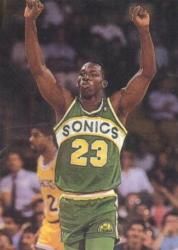 Olden Polynice 1987-1991, 1998/99 | 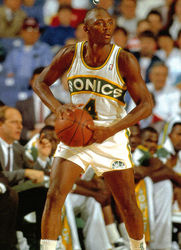 Sedale Threat 1987-1991 | 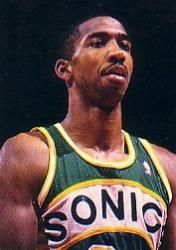 Derrick McKey 1987-1993 | 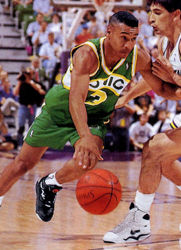 Dana Barros 1989-1993 | 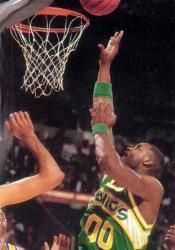 Benoit Benjamin 1990-1993 |
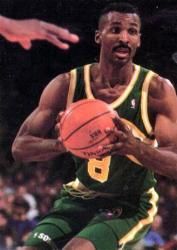 Eddie Johnson 1990-1993 | 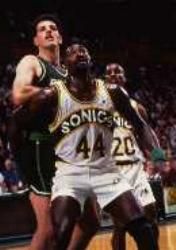 Michael Cage 1988-1994 | 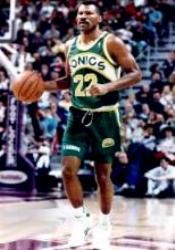 Ricky Pierce 1990-1994 | 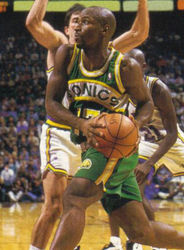 Vincent Askew 1992-1996 | 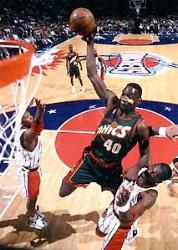 Shawn Kemp 1989-1997 | 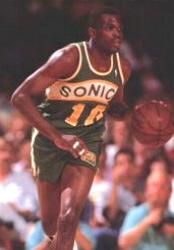 Nate McMillan 1986-1998 |
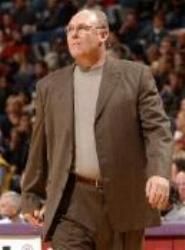 George Karl Coach 1991-1998 | 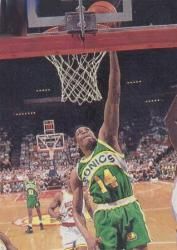 Sam Perkins 1992-1998 | 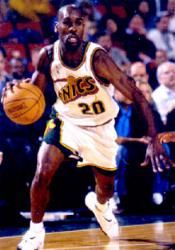 Gary Payton 1996 Defensive Player | 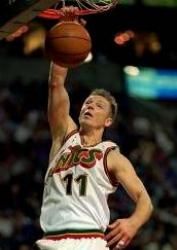 Detlef Schrempf 1993-1999 | 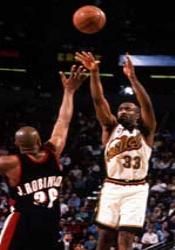 Hersey Hawkins 1995-1999 | 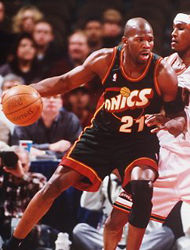 Ruben Patterson 1999-2001 |
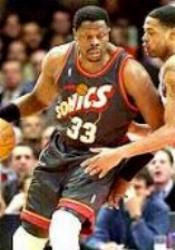 Patrick Ewing 2000/01 | 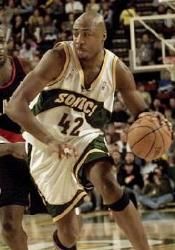 Vin Baker 1997-2002 | 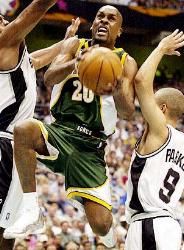 Gary Payton 1990-2003 | 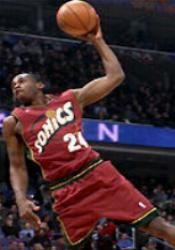 Desmond Mason 2000-2003 | 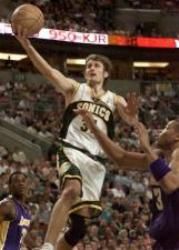 Brent Barry 1999-2004 | 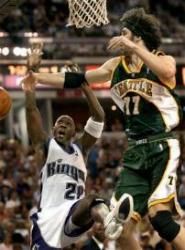 Vladimir Radmanovic 2001-2006 |
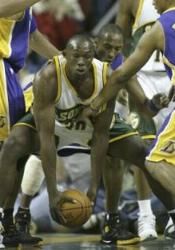 Reggie Evans 2002-2006 | 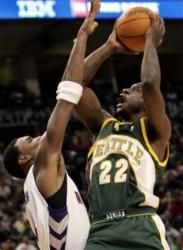 Ronald Murray 2002-2006 | 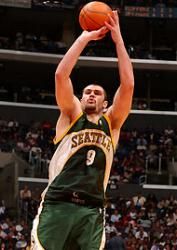 Vitaly Potapenko 2002-2006 | 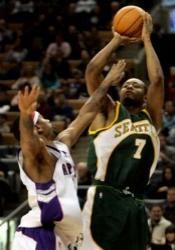 Rashard Lewis 1998-2007 | 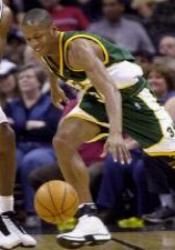 Ray Allen 2002-2007 | 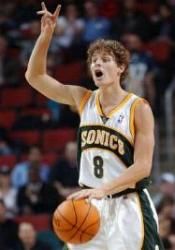 Luke Ridnour 2003-2008 |
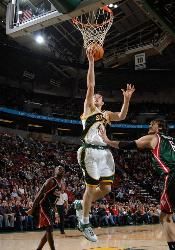 Nick Collison 2004-2008 | 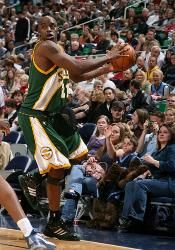 Damien Wilkins 2004-2008 | 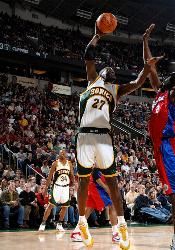 Johan Petro 2005-2008 | 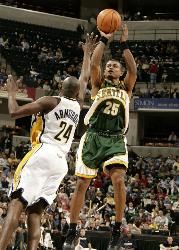 Earl Watson 2001/02, 2005-2008 | 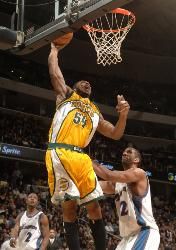 Chris Wilcox 2005-2008 | 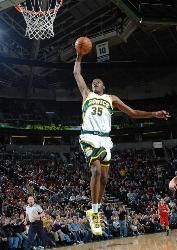 Kevin Durant 2007/08 2008 Rookie of the Year |
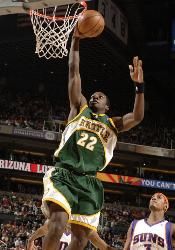 Jeff Green 2007/08 |
